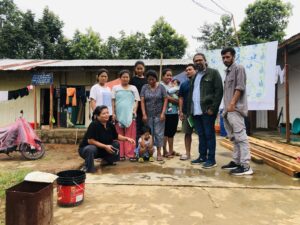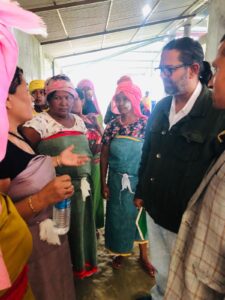It has been one year since the tragic events that unfolded in Manipur, leaving scars of violence, loss, and anguish in their wake. The violence, which erupted amid tensions over land disputes and ethnic rivalries, triggered by the intent to dominate the reported Rs 70,000 crore narcotics trade and perpetrated by the proscribed terror groups in the Northeast state, resulted in loss of lives, displacement of communities, and deep-seated trauma that continues to reverberate across the region. As we pause to reflect on the aftermath of the Manipur violence, it is imperative to confront the challenges of reconciliation, healing, and justice in pursuit of a more peaceful and inclusive future. We must also accept the startling truth that no one is a saint in the conflict that erupted in Manipur.
The violence in Manipur underscored longstanding grievances and fault lines that have plagued the region for decades. Issues related to land ownership, ethnic identity, and political representation have fuelled tensions and conflicts, exacerbating inter-community divisions and mistrust. Against this backdrop, the outbreak of violence served as a stark reminder of the urgent need to address underlying socio-economic disparities and historical injustices that have marginalized communities and perpetuated cycles of violence.

Having immersed myself in the heart of the conflict-affected areas in Manipur. I ventured into remote villages met with the displaced communities and witnessed firsthand the devastation wrought by violence and displacement. Listening to the harrowing accounts of survivors, it was disturbing to listen to the stories of loss and trauma; but encouraging to see the resilience, and hope that define the human experience amidst adversity.
In the aftermath of the violence, efforts to heal wounds and rebuild trust have been essential to fostering reconciliation and resilience among affected communities. Grassroots initiatives, community dialogues, and peace-building efforts have sought to promote understanding, empathy, and solidarity across ethnic and religious lines. Civil society organizations, religious leaders, and community elders have played a pivotal role in facilitating dialogue, providing psychosocial support, and promoting reconciliation at the grassroots level.

Amid calls for justice and accountability, efforts to hold perpetrators accountable for their actions have been critical in addressing the grievances of victims and rebuilding trust in institutions. The establishment of independent commissions of inquiry, the prosecution of perpetrators of violence, and the provision of reparations for victims must be key steps in seeking redress and ensuring accountability for human rights violations. Moreover, initiatives aimed at addressing the root causes of conflict, including land disputes and resource allocation, but most of all crackdown on the burgeoning reportedly Rs 70,000 crore narcotics trade and elimination of the proscribed terror groups tacitly funded by China are essential to preventing future outbreaks of violence.

Building on the lessons learned from the Manipur violence, efforts to strengthen social cohesion and resilience between the Meitei, Kuki, and Nagas are essential to preventing future conflicts and promoting sustainable peace. Investing in education, economic opportunities, and social services in marginalized communities can help address underlying grievances and empower individuals to build a more inclusive and equitable society. Moreover, promoting inter-community dialogue, fostering cross-cultural understanding, and celebrating diversity can contribute to building resilient communities that are capable of overcoming divisions and embracing shared values of peace, tolerance, and cooperation.
As we mark one year since the Manipur violence, it is incumbent upon all stakeholders—government authorities, civil society organizations, religious leaders, and community members—to reaffirm their commitment to peace, justice, and reconciliation. By addressing the root causes of conflict, promoting dialogue and understanding, and fostering inclusive development, we can pave the way for a more peaceful and inclusive future for Manipur and its diverse communities. In doing so, we honor the memory of those who lost their lives and reaffirm our collective resolve to build a society where all individuals can live with dignity, respect, and harmony.































